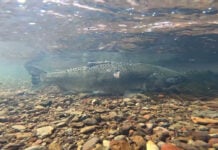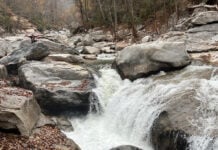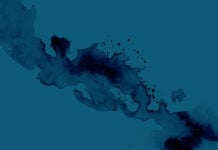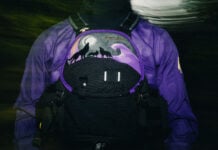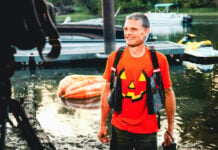All paddleboarders know it takes a certain degree of balance, alertness and physical fitness to stay on your feet and keep your board moving forward. Now imagine trying to stay on your board after more than 50 hours, paddling a fast-moving northern river with unexpected boils and eddies, while sleep-deprivation and hallucinations mess with your mind. This past summer, 11 paddleboarders did just that, setting out with canoes and kayaks from Whitehorse to Dawson City, in the longest annual paddling race in the world, a distance of 715 kilometers.
Adding a paddleboard category to the 2016 Yukon River Quest was a source of much debate among organizers. Committee members wanted the race to stay current with paddling trends and the increasing popularity of paddleboarding. Yet many feared that this new addition would sap volunteer resources and result in added safety or logistical concerns.
“Initially, I was really surprised that boards were going to be in the race,” says race photographer Elise Giordano. “It’s such a grueling task for someone sitting down, but standing for 444 miles seemed insane.”
You have to be fit both physically and mentally – de Zwart
Giordano caught this shot (header image) on the first day of the race from a media boat. “When I saw all of those paddlers and SUPs drafting one another, it just looked like the epitome of the race,” says Giordano. “Fifty-kilometer-long Lake Laberge is one of the most difficult stretches, so seeing these teams work together to get across was a pretty great moment.”
Each year approximately 25 percent of teams drop out due to injury, exhaustion or hypothermia. It’s no wonder many were skeptical as to whether the paddleboarders could even finish within the required 74-hour time limit. In the end, nine out of the 11 SUPs finished the race.
“The SUP competitors were very self-sufficient,” says race president Harry Kern. “They successfully navigated challenging sections like Five Finger Rapids, and even if they capsized, it wasn’t a yard sale like when other boats capsize—they were remarkably efficient at recovery and within minutes were back on their feet.”
Winner of the SUP category, famed expedition paddleboarder Bart de Zwart, completed the race paddling at an average speed of 13 kilometers per hour in 54 hours and 41 minutes.
“It is the longest race I have ever done,” says de Zwart, whose accomplishments include paddleboarding a portion of the Greenland coast and winning the 11 City Tour. “There were many times when I felt sleepy and lost focus for a couple of hours. Keeping a good high average speed is the key to success even when tired—don’t stop and keep going, even if it is at a slower pace.”
Out of just under 100 contestants in various categories, de Zwart placed an impressive 26th overall.
The Yukon River Quest board has agreed to include boards again in 2017. De Zwart’s advice for them? “You have to be fit physically, but also mentally prepared,” he says. “Everybody is hurting after 10 hours on the water, but the ones who can keep going despite that do well.”



